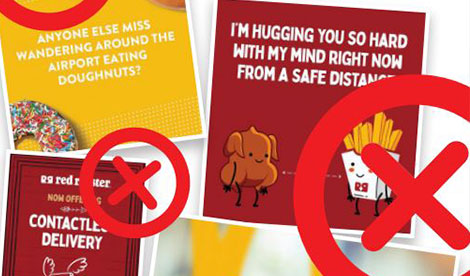

Blog

Junk food marketing in the time of COVID-19
Monday May 25, 2020
McDonald’s has been spearheading this opportunistic marketing, promoting its new “essentials” range (bread, milk and eggs) as providing a much-needed public service. Notwithstanding the obvious health implications resulting from bringing people through their stores to purchase the regular unhealthy menu items, they are taking business from struggling small retailers.
Other quick service restaurants have been quick to adapt their marketing strategies. Subway is promoting having a “sub on your sofa”, while Domino’s Australia is publicising “5 Reasons to eat pizza in isolation”. Meanwhile Red Rooster is using the pandemic to make light of the idea of social distancing.
Millions of children have been at home over the last few weeks. Busy parents are trying to home school while simultaneously working, meaning limits on screen time have been abandoned. Junk food marketers, knowing they have a captive audience have leveraged this situation with marketing directly targeting kids.
Krispy Kreme is promoting donuts as a multi-tasking option, while Skittles is promoting an art competition.
Junk food brands know that marketing influences what kids eat and pester power is a known phenomenon. By using the current pandemic to push their marketing agenda, they are encouraging children to eat unhealthily.
The marketing seems to be working. A recent YouGov survey found that we are eating less healthily than usual. Similar findings are appearing in international studies. Alarmingly, a number of the unhealthy food outlets have been building brand awareness by offering free drinks to our frontline healthcare workers, and showing these essential workers consuming their products as part of their marketing campaigns. While Krispy Kreme’s ‘Doughforce project’ is delivering doughnuts to hospitals, McDonald’s and Hungry Jack’s are offering free beverages to healthcare workers.
Arguably one of the worst examples of this has been Domino’s Australia, which has just launched a new ad featuring its CEO, who states: “We are playing our part to keep Australians safely fed.”
These companies would argue their intent is purely altruistic, but these workers are on the front line and most at risk. Maintaining their health by eating nutritious food is of paramount importance – unhealthy products made from energy dense ingredients are not what they need.
Politicians have been highlighting that we are not just dealing with a health crisis, but an economic crisis. Arguably the junk food industry wants to ensure its revenue remains stable, but the speed with which they have shifted their marketing strategies creates ethical challenges.
Consistent research emerging from the UK and the US has revealed that people who are above a healthy weight are more at risk of developing severe COVID-19 complications. This evidence is alarming, and even more reason for people to maintain a nutritious diet in order to be in a position to fight this illness.
Consumers are a vulnerable and a captive market at the moment, due to their enforced isolation, and they should be aware of particular advertising that is targeting their uncertainty, isolation and boredom. We are being asked to stay home in order to protect our health and that of others in the community. Is the heavy promotion of high-energy dense food with limited nutritional value the type of marketing we need?
The evidence is clear that marketing has an impact on the diet of Australians, especially children. The marketing of junk food is largely self-regulated and it is imperative that all levels of government introduce stricter regulations to protect Australians from the influence of these types of marketing tactics.
The WA Government has an important role to play in this. The Final Report of the Sustainable Health Review recommended the banning of junk food advertising on government-owned assets, and public health organisations such as Cancer Council WA, Telethon Kids Institute and the AMA (WA) have been calling on the State Government to implement this recommendation.
Restricting junk food advertising on state assets would reduce exposure to unhealthy food advertising to all West Australians.
The lessons learnt from COVID-19 will be many, but the growing evidence that being above a healthy weight is a risk factor for COVID-19 complications means governments must focus on prevention in the future.
References available upon request.

